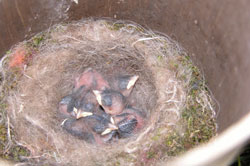Vol. 2 Issue 2, Spring 1997
By Anne Hocker

Photo by Nicole Hamilton
This time of year, one may encounter very young birds out of their nests. If apparently uninjured, a bird with “cotton down” still on its head or immature pinfeathers must either go back to its nest or to hastily constructed substitutes with proper drainage, like a wicker or plastic berry basket. If possible, put it as close to the nest as you can and watch it from a distance, preferably from inside your house. Sometimes the parents will hear and feed it, sometimes not. If parents don’t return within a couple of hours it should be considered abandoned and go to a licensed wildlife rehabilitator. Don’t try to keep it yourself, as the possession of wild birds is regulated by federal law.
A bird’s metabolism is extremely high, so act quickly. Don’t feed it unless instructed by a licensed caregiver as improper food or technique can often be fatal. Fledglings are bird teenagers who want to fly but aren’t ready yet. They are fully feathered, but the feathers may be somewhat shorter than normal. Their parents will continue to feed them on the ground or on a branch while they are learning to fly. If a fledgling is in danger from ground predators, you may be able to carefully pick it up and put it on the highest branch you can reach. Don’t worry about your scent – the parents won’t care.
Keep your dogs and cats inside until the parents have scolded it to safety. Sometimes you can simply shoo it to the protection of a nearby bush if cats are present. It is better to keep your pets locked up for a couple of days than lose an entire generation of baby birds. Birds usually have a better chance if returned to their parent tree or nest than if they are taken into captive care. While some rehabilitation centers such as the Wildlife Center of Virginia have foster parents (non-releasable birds of the same species) for orphan raptors, they are still a poor substitute for Mom and Dad. If you must remove a youngster, note where you found it, since a rehabilitator may try to return it there after it passes “flight school”. When a young bird must be moved, remember the cardinal rule for temporary holding and transport is “warm, dark, quiet.” A shoebox padded with Kleenex is sufficient to support the soft young bones and keep it insulated.
Raising a bird is a complex process – vocalization, foraging, socialization, diet and fear of predators are just some of the lessons the real parents can teach and we can barely fathom. Loudoun area wildlife rehabilitators may be reached through the Loudoun County Dep’t of Animal Services at (703) 777-0406 or by email at animals@loudoun.gov; Animal Emergency & Critical Care at the Life Center at (703) 777-5755 or by email at aeccatlc1@gmail.com; or your local veterinarian. The Wildlife Rescue League, (703) 440-0800 or http://www.wildliferescueleague.org/contact, can direct you to a rehabilitator in Northern Virginia.

